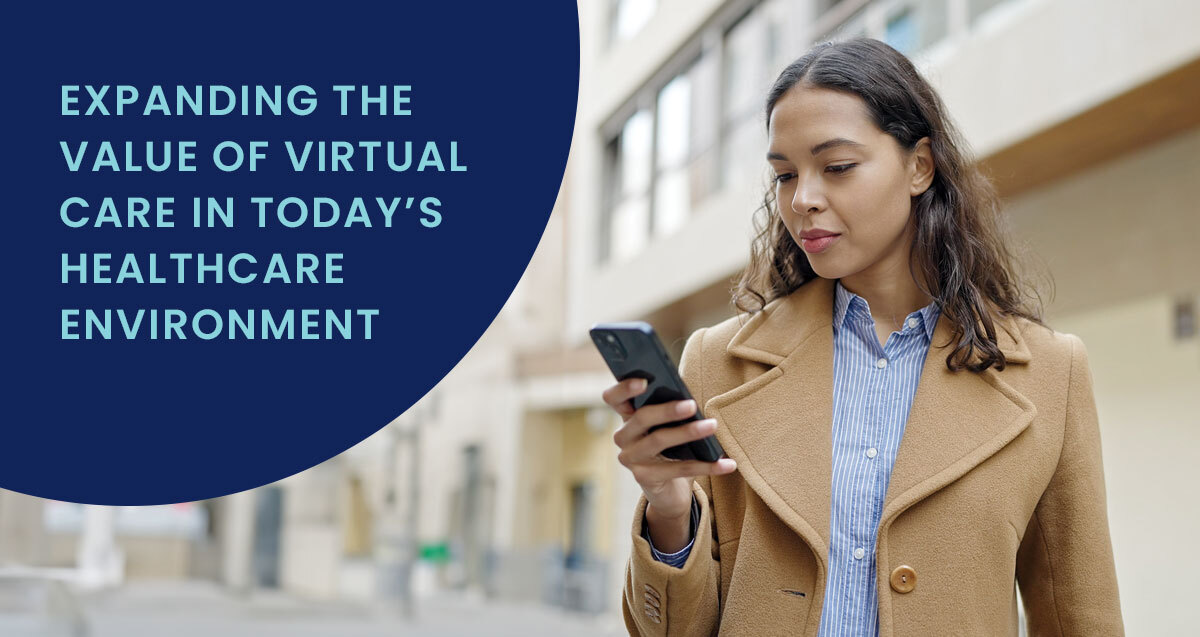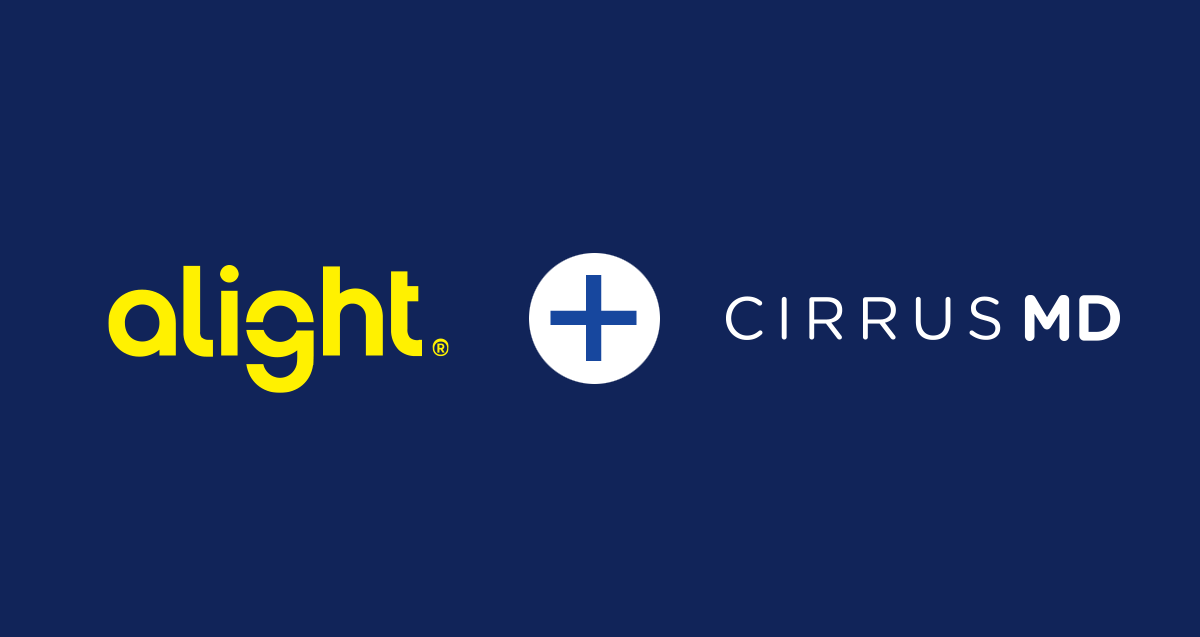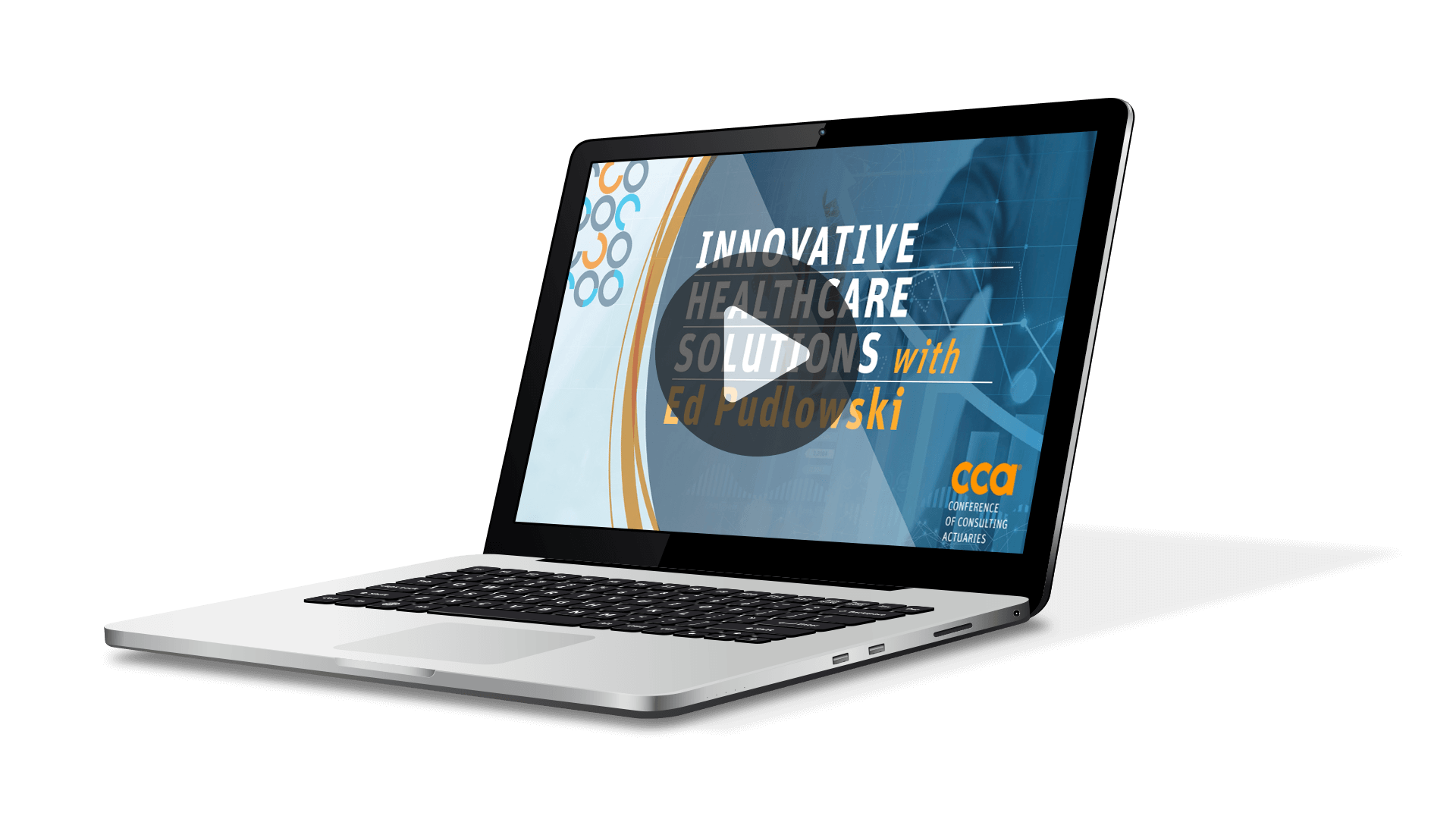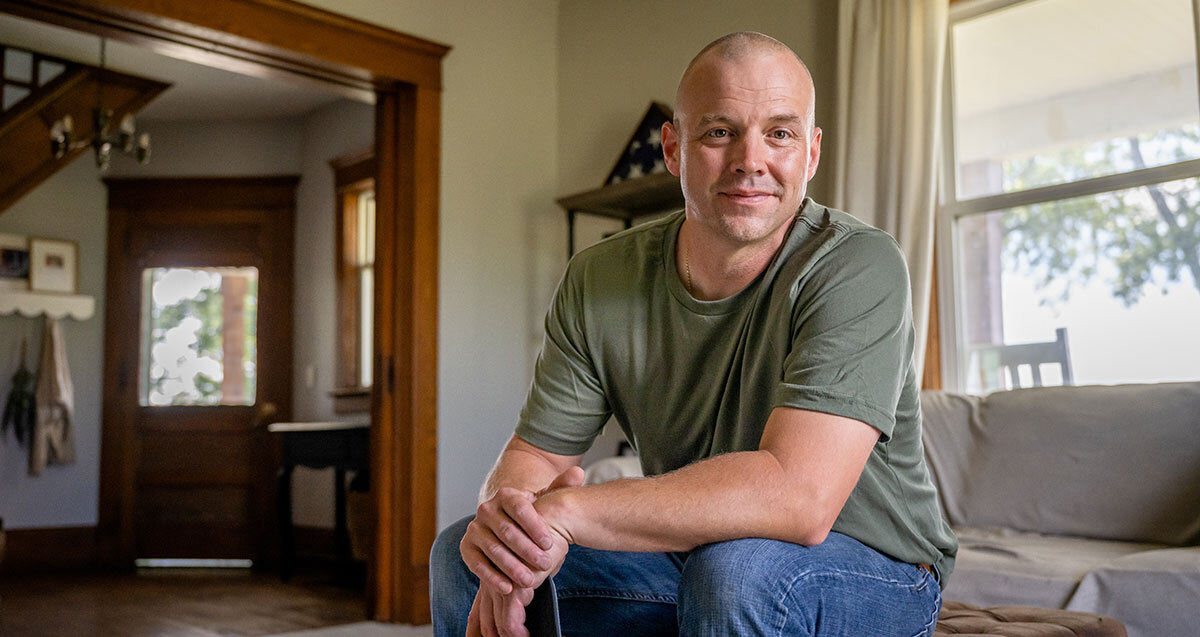
Video Transcript
Ed Pudlowski:
Hey, welcome everybody to the podcast series on Innovative Healthcare Solutions sponsored by the Conference and Consulting Actuaries. As you've probably seen in the past, these podcasts or a series of interviews with professionals focused on delivering innovation in healthcare. Now, these sessions are offered to provide insights about what's transpiring in our ever-changing healthcare environment in which we live. My name's Ed Polowski. I'm the president of Morningstar Actuarial Consulting, and I'm also the chair of the healthcare community of the Conferencing Consulting Actuaries. And I'm going to be your host for today. Now, I'm really delighted today to be joined by Jamie Hall. Jamie is the CEO and president of Cirrus md. Now, for those of you who can't maybe spell it, C-I-R-R-U-S MD. Cirrus like the cloud, I believe, Jamie, right?
Jamie Hall:
That's correct,
Ed Pudlowski:
Yeah. Well, thanks for joining us today.
Jamie Hall:
Yeah, thanks so much for having me. It's always a pleasure and really excited to have this conversation with you.
Ed Pudlowski:
Well, I'm excited too, but I'll tell you why, because I've seen Jamie, the passion that you have in trying to make improvements in the healthcare delivery system and also the passion that you have, obviously with CirrusMD. So I'm thinking that I'm just going to ask one question. I'm just going to sit back and let you talk for the next 20 minutes.
Jamie Hall:
That sounds great.
Ed Pudlowski:
No, all joking aside, so CirrusMD is a virtual physician first care and guidance solution. So tell me what that means.
Jamie Hall: Yeah, I'd be happy to. And actually it's pretty exciting because we just launched this new solution earlier this month, so it's brand new and sort of hot off the presses. But maybe before jumping into that, lemme just give our listeners some background on CirrusMD and what this organization has been up to for the past decade. So traditionally, CirrusMD has provided virtual primary and urgent care. We do it on a chat first modality. So it's as easy as texting a friend or a colleague. And we do it in a way that is always on. So we're always available to our members 24 7, 365 in all 50 states. We do it in a way that is instantly accessible. So sort of uniquely our members, our patients get connected to a live doctor. It's never a bot, never a triage tool, but actually a live doctor, on average, it's about 15 seconds.
Jamie Hall:
From the time you say, ouch, that hurts, doctor, I need some help. There's actually a human being, a physician somewhere texting you back and saying, I'm right here. How can I help you? And we think that that first and foremost is super helpful, but also it is really efficient and effective in treating care. So 83% of all of the care that comes onto our platform, people who come through our virtual front door every day is taken care of virtually on the platform. And we may use different modalities. It starts with chat. It could end up in video and other ways of communicating, but it's taken care of on the platform. So we're lifting a ton of care that otherwise would have to go to brick and mortar care, and we're just getting it taken care of in a really effective way. But I think what I love maybe the most about it is that it's hugely empathetic.
Jamie Hall:
The ability, we have 96% patient satisfaction scores. Part of that is because of this modality of chat, which has a degree of anonymity. People tend to share a lot more. I always tell people that people who chat or chatty, they tend to share a lot more information with us, and our physicians love to practice that way. So it's just a really great, great way of connecting with the patient. And I should mention actually, we serve 10 million members today, and our members find us through their self-insured employers through their commercial health plans, Medicaid beneficiaries, through their health plans. And we're just really honored to serve our veterans across the country through the va. So we serve a lot of different and varied populations using this modality, but to physician first care and guidance, which I'm super passionate about. What we did is we stepped back and we said virtual care sort of came into its own during the global pandemic when we had to have different ways of connecting with patients.
Jamie Hall:
We've been using that more and more, but we haven't really stepped back and said, if we were to reassemble intelligently reassemble all of the points of care, leveraging the unique qualities and aspects of each, could we put together a better care delivery system, a better way of people to access, receive, and experience care if we really thought about it? And so from our vantage point, first and foremost, we use this chat modality, which is really easy. And I would guess that just about everybody who's listening to your podcast, ed has probably sent a text to family or colleagues and is probably doing so today. So text is just easily accessible to everybody. You don't need a desktop, you don't need a quiet place. Shift workers, anybody can do that really easily. You only need to sell a signal on a phone. The second piece is that we are interacting with our patients overstructured unstructured data.
Jamie Hall:
In this brand new world of generative AI, that means that we have the ability to actually listen to and interact with that data as it's happening between a physician and a patient. That's another unique piece. We actually have 50 million chats between doctors and patients that we've conducted over the years that we can use to train to annotate these new large language models. So that's super exciting to us. And then we think about the ability to gather information on somebody's network options. Also, the benefits that an employer might offer to a patient, and that's the benefit of Async, which is this. It's not necessarily real time back and forth between a physician and a patient that gives us the time to define and grab and surface information that could be available to a patient. So what we have built is, and we call it physician first care and guidance because you're always met with the physician first and in seconds we provide care.
Jamie Hall:
Whatever type of care you need, if it can get taken care of virtually, we're going to do that in a really efficient and empathetic way via chat. If it needs to go to the home or it needs to go to a clinic or it needs to go to a hospital, you need hands-on care in a physician to actually see you. We are going to use our platform to first and foremost, and the training, empathy and knowledge of the physician, a trusted physician to find your options that are available to you through the benefit plan that you have, and direct you through a lens of cost and quality to the right setting and the right clinical resource to get you to that best next step. So we think that that's really important. The other element that I think is just new that we haven't done before is surfacing employer benefits.
Jamie Hall:
For those customers of ours who are accessing us through a commercial health planner to their employer, they may have access to really great quality programs for type two diabetes, for cancer care, for MSK care. And those never get into the conversation traditionally, historically between a doctor and their patient. But because we can get access to that information, because we have this unique way of communicating with our patients, we can surface that information in that dialogue and then use a doctor, the most trusted resource, we think the best messenger to say to a patient, if I were coming in, then maybe I've got a migraine headache, but we understand that I'm a type two diabetic and that's somehow contributing to my condition. And we would say to the physician, Jamie is living with this condition, by the way, he has this resource who his employer and all that our physician has to do is drop it into the chat, say, Hey, Jamie, this is free to you through your employer. Are you aware of that? That never happens. So that's net new. So we're super excited about it, and we think that it's going to create a ton more value for our members, first and foremost, our patients, but also for the plan sponsors and other organizations that use this.
Ed Pudlowski:
That's tremendous because one of the things that I learned very quickly when I started working in the healthcare field way too many years for me to actually lay out here in front of everybody, but what I found is that people don't typically start to understand what benefits or options that they have until they actually need care. So you guys are providing that source as opposed to them going through all their literature or emails or whatever they get from their health plan. That's tremendous. So Jamie, talk a little bit though about the physicians that are on your platform and their experience, because this has to be a little different model, I think, than most physicians are used to. And since those are your first point of contact, these individuals have got to be more excited about this platform than they would most in any other environment in which they can work.
Jamie Hall:
Yes. So we have our own multidisciplinary physician network, and they are our employees, and we take great pains to make sure that we have good physicians on the platform, in addition happy physicians. And so our net promoter score for our physicians are generally in the high eighties, which is again, incredibly rare. And part of the reason for that is they get to practice the way that they wanted to practice. We are in a situation in the US where we're losing primary care physicians, the frontline workers for healthcare delivery at an unsustainable rate. And at the same time, the cost, the complexity barriers to healthcare continue to get higher and higher. So it becomes more and more difficult for physicians to manage more patients in brick and mortar settings and even settings, traditional telehealth where you're zooming in, you're just managing one patient at a time, you're maybe in a fee for service arrangement and you're just trying to get through to the next patient.
Jamie Hall:
We actually give our physicians and our patients a seven day encounter window. So think about that for a second. For the physician, you have all the time in the world to ask the right questions to engage with that patient, to get maybe not just the chief complaint, but the underlying reasons that may be impacting that or maybe underlying chronic conditions. So think about this for one moment. We have coming to our virtual front door, hundreds of thousands of patients who have the typical things you'd think of for virtual care, coughs, colds, migraines, UTIs, those sorts of episodic issues. But we know from a population health standpoint that half of those people have some sort of an MSK issue that should be seen clinically. Half of those people are either pre-diabetic or living with type two diabetes. A ton of those people are in this day and age are dealing with stress, anxiety, depression.
Jamie Hall:
So we're not the model that uses about to triage and transition that episodic stuff. We see all of that as an opportunity and building in a window that allows a physician to work with the patient allows a patient to have a dialogue and not feel like they've got to crank through to the resolution of why they came in in the first place, just creates a much better environment. And our physicians regularly tell us that a lot of 'em have come out of private practice because burning out and they say, this is great. I actually have the time with my patients. I can actually help them. I can get back to them and say, try this and get back to me in a day or two and just let me know how that goes and let's keep working on this together. So we just think for our physicians, and we always think happy physicians make happy patients that we've, we are setting them up for success by giving them the tools and resources, giving them the information they need, and we just talked about that, but also giving the time that they need in order to practice at the top of their license and in a way that's satisfying to them.
Ed Pudlowski:
I'm sping about that because I've seen cultures of organizations and the ones that treat their employees right, understand that they're going to treat their clients and their customers. So you certainly have embodied that model and it's showing up in some of the clinical results that I went out to your website and looked at some of the clinical studies you have there. So Jamie, we'll ask you to kind of cite some of these statistics. I have the written down here, so let me share those and then kind of ask you to talk about a little bit. But some of the clinical studies you've done around anxiety, depression, and asthma, and on anxiety, you showed a reduction of almost seven points on the GADD seven scoring, and at about 68% of your patients saw a reduction of at least five points. So that's fairly significant. If you understand anything about those scorings related to depression, 7.71% is clinically significant, and I think you've shown that, and I think 72% of your patients have been reduction of at least five points on the PHQ nine scores. And then for asthmatics, it's been over a four point improvement in the A CT scores.
Ed Pudlowski:
And anything three or more is considered clinically important. So you've done a tremendous job from a clinical side, which shows that your physicians really enjoy what they're doing and they know what they're doing. But can you expand upon some of those scores and how your folks are really improving the overall quality of care that they're getting?
Jamie Hall:
Yeah. A couple of things, and I'll give you one more that I always find super impressive, which is for antibiotics, we prescribe at a rate that's about 80% below the industry standard. And all of those things are connected to the topic we just discussed. First and foremost, setting up physicians for success to be able to have the right conversations with their patients. It's about this, especially with stress, anxiety, depression, people tend to share more. It's not, there is a power imbalance that we all are familiar with. When you walk into a doctor's office, you've waited for them. You may be in a gown and they're in a white jacket and trying to have really deeply personal conversations. Sometimes patients don't feel free to express themselves just because of the dynamics of that. Our patients feel free. I think, and we've got to do some studies on this because I think that the behavioral elements of chat, the anonymity of chat really gives us a much richer conversation with the patient oftentimes.
Jamie Hall:
But secondarily, it's taken all the pressure off of the time constraints, giving our physicians all the information that they need in order to really, a lot of times we're catching that stress, anxiety, depression be as a secondary issue to maybe what the patient originally came in for. So we're getting at more of it and then we're treating it, I think really effectively. It's also because we work in a primary care setting with the tenants of advanced primary care. So we're trying to get the right patient to the right physician. Our physicians behind the scene work in a, I'm just going to call it a hive because they're connected all in real time. So when a patient comes into a physician, the first thing is they may say, I want a different physician. Maybe they want to work with a female physician. So first of all, it's on the patient's timeframe.
Jamie Hall: It's also the patient's choices, the patient's preferences are reacted to as they come on. But also our physicians can work in concert in the context of a single encounter with a patient and a physician. So a physician may say, Hey, I'm not quite sure how to handle this. Can connect with the other physicians who are online in real time because they're all working a sync. They can do a curbside consult with somebody who has a specialty and then bring that into their patient. Or they may reach out to one of our behavioral health specialists and say, Hey, Jamie, it sounds like you're dealing with some really stressful situations. I'd like to have you talk to one of our specialists. Can I bring her into the chat or can I transfer you over to her? She can pick up the chat. Think about the way that that happens in a brick and mortar setting.
Jamie Hall:
Well, here's a referral. Good luck to you and go find your way into it. So we just think it's, first of all, the front end care is a much better, and within the context of primary care, we can get a lot taken care of in those areas that you just cited. But beyond that, we can get people to specialists within our virtual care delivery group or then, as I talked about earlier, find a resource in your network and help you get to that most appropriate resource. So I think it's just about being, again, more efficient and more empathetic on the front end.
Ed Pudlowski:
I assume that there's also an opportunity to push care to the most appropriate resource. In other words, avoiding some use of unnecessary resources that you might see in a traditional health plan setting without in the absence of a solution like yours.
Jamie Hall:
Yeah. You kind of touched on really one of the fundamental point of view that we take about how healthcare is delivered today. And so we talked earlier about we have sort of two trends running in separate directions, right? Care is getting more expensive, more costly, not necessarily more accessible, despite all of our best efforts to make it that way. On the other hand, we're losing primary care physicians at an unsustainable rate. And so what we tend to do as an industry is we tend to throw up digital tools, symptom checkers, non-clinical navigators that meet us where we're not being a patient, lower level clinical resources before we get to see a doctor in the effort to try to lift the load off the primary care physicians that we have to make the workload more manageable. We think that's upside down. And what I mean by that is that we think that if you could start every patient journey, whether it's I've got a cold, it's cold season now, so we've got something small like that, or I'm dealing with multiple chronic conditions and I need to figure out how to access, where to access the right resources to help me on my journey.
Jamie Hall:
If all of those started with a simple chat with the doctor that happened in seconds, and that physician could then start you off on the right foot, a clinically appropriate foot, then actually we would take a lot of frustration, a lot of waste out of the system on the front end. And some of those tools, I mean, they're really great tools out there available to us, would be aligned behind a physician's plan of care. But we just think that's a much better way of doing it. And that's why we rolled out physician first Care and guidance.
Ed Pudlowski:
Great. Yeah, I can imagine a lot of care that might've gone to the emergency room or to the urgent care facility or even missed primary care physician visits. I've experienced it myself in using resources like that. It allowed me to kind of avoid unduly utilizing the healthcare resources that were unnecessary.
Jamie Hall:
I would just say that, I mean, my own personal experience with primary care after the pandemic, it took me months to get in to see a primary care physician who was hugely disruptive. Like you we're all busy and you've got to stop everything and then go and sit and wait, and then you get in to the visit for 10, 15 minutes and really good primary care doctor, but it was hugely dissatisfying. A lot of it was just taking down information that you wish that they had had already, and then you leave with a bunch of orders for getting labs and doing things like that. I could have done that in seconds. I could have done that while we're having this conversation and had a very similar, probably much better result. So we think that we can just be, we want to optimize for the physician. We want to optimize for efficiency rather than ration access. And that's kind of what we're talking about with physician first Care and guidance.
Ed Pudlowski:
Well, I'm going to be really excited to see where AI can take you guys. I think AI in healthcare just has tremendous opportunity. So I applaud you guys for making sure that you're staying top on leading edge technology like that. So Jamie, I'd like to really end a lot of these podcasts on kind of a personal note. So I know you have a tremendous passion about making changes and improvements in our healthcare system, and it's certainly much needed. But what other passions do you have? If you didn't go into this line of work, what would you be doing?
Jamie Hall:
Well, I said I think another one of these, my passion was writing and teaching. And certainly teaching is a lot of what you do in this role, but that was my path. And I just happened to take a job that was available and get way back in the early nineties, which sort of got me down on this path. But my real passion today is I've got two teenage kids and that consumes about every second of your life outside of doing this in a really wonderful way. But, and we're all very outdoorsy folks. We love to get out and ski and bike and do all that stuff. So that's what I'm doing. If I'm not talking to great folks like you,
Ed Pudlowski:
I'm glad to hear that family is very important to me, and I kinda share that with you. Hey, Jamie, thanks so much. I'd really like to encourage our viewers who also participate in our healthcare community within the CCA to continue any discussions about the insights that have been shared here on that platform. And if you're not a member of the CCA, I want you to consider joining because to experience the benefit of the community platforms that I talked about and some of the informal discussions that transpired there, but some of all the great benefits that our members enjoyed today. Jamie, thanks so much for being here and sharing your insights around CirrusMD and the types of innovations that you guys are employing to drive a better healthcare system. I'm sure our audience enjoyed this discussion, and I know I did. So again, thank you very much.
Jamie Hall:
Well, thank you, Ed. Thanks for having me.




